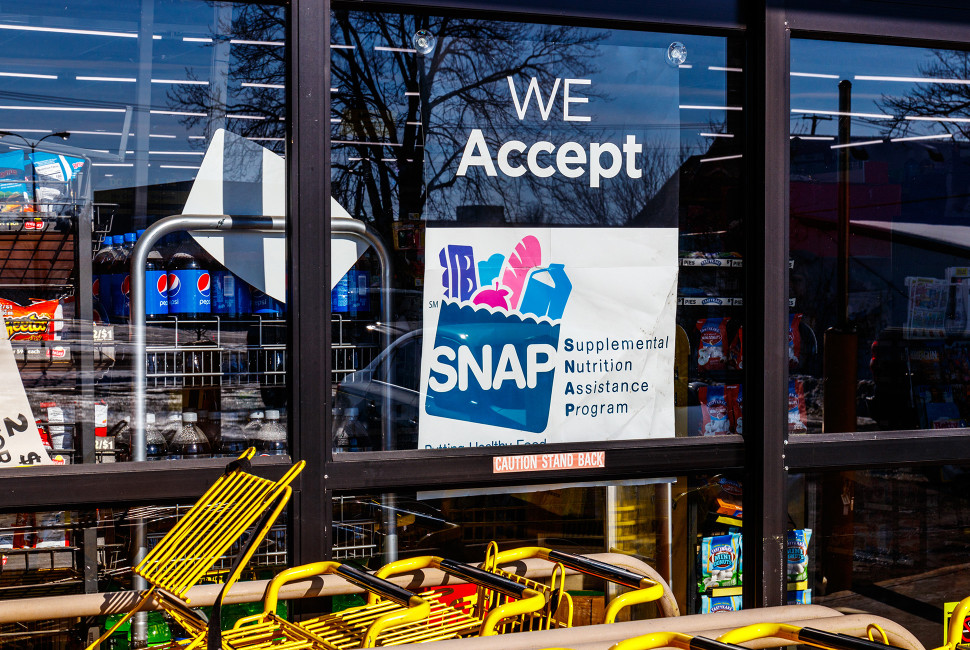As what is now the longest-ever U.S. government shutdown continues, more than 41 million Americans are uncertain how much of their monthly Supplemental Nutrition Assistance Program (SNAP) benefits they’ll receive and when.
Northwestern health economist and policy researcher Lindsay Allen calls the scenario “a direct attack on working-class families who rely on SNAP to feed their children.”
“The SNAP cliff isn’t theoretical, and states are already notifying families that in a few days they won't be able to put food on their table,” said Allen, assistant professor of emergency medicine in the Buehler Center for Health Policy & Economics at Northwestern University Feinberg School of Medicine. “Cutting off food assistance to force political concessions is cruel, and economically irresponsible, because SNAP is one of the most effective anti-poverty tools we have.”
- Related: A recent Northwestern Medicine study finds food insecurity in early childhood is associated with worse heart health two decades later. But SNAP participation may mitigate that risk >
“Democrats are holding out because they don’t want to get rid of the enhanced Affordable Care Act subsidies, which a lot of American's don’t realize is the only thing keeping coverage affordable for them,” Allen said. “Unless Republicans agree to extend tax credits, people are going to be shocked by how much their insurance is going to go up. They won’t be able afford groceries, rent, medication and more because their premiums are going to go up by 75% overnight.”
Bethany Doerfler, the chief clinical research dietitian of the digestive health institute at Northwestern University Feinberg Northwestern Medicine, also sat down with Northwestern Now to talk about the important role of food assistance for public health.
How could a lapse in SNAP benefits influence how recipients eat and their overall health?
“Access to healthy food is a major determinant of what people eat. Unhealthy food is cheaper and easier to get, and that’s a problem for people managing chronic diseases like diabetes, cancer and metabolic conditions. Food assistance programs shape what people eat at school, at home and beyond.
“What we see is that people quiet their hunger with whatever food they can find, and that usually isn’t healthy foods. It completely undermines what we as healthcare providers are trying to do when we teach self-care or disease prevention. You can’t talk about self-care when people don’t have healthy choices.”
What could the impact be on children, who make up a significant portion of SNAP recipients?
“When children don’t have enough to eat, it hurts their school performance, and that impacts the economy. But it’s also a public health issue. For example, children in urban areas who lack iron and calcium are more vulnerable to lead poisoning because those nutrients compete with lead for absorption. Food insecurity doesn’t just mean hunger, it means exposure to environmental toxins, poorer learning and psychological stress for children.”
Are some families more vulnerable than others?
“All families who receive food assistance need it. As a clinician, I can assure you it’s not easy to apply for or qualify for SNAP benefits — the people who get them truly need them. Every family that depends on that support will feel this impact. But it’s particularly hard for families where one or more people have a physical or cognitive disability. I have many patients with significant cognitive or developmental delays, which means a caregiver has to stay home and care for them. Those are the families that really struggle to find outside sources of financial support to make up the gap when these programs disappear.”
How does limited access to healthy foods affect chronic disease management?
“Let’s take diabetes, for example. When a teen or an adult has type 2 diabetes, the preferred treatment is lifestyle intervention: eating whole foods that are high in fiber, low in saturated fat and low in refined carbohydrates. That means lean proteins like fish, poultry and beans, and plenty of fresh or frozen fruits and vegetables. But those are exactly the foods that become too expensive when people have less money to spend on food. So, they gravitate toward bulk, starchy meals like pasta or rice dishes. Those foods aren’t bad in themselves, but they shift the balance away from what we recommend for managing diabetes. The same thing happens with certain cancers where lifestyle factors play a role. When people can’t afford fresh produce, the first thing to go are fruits and vegetables, which are exactly the foods that can help prevent cancer or reduce the risk of it coming back.”
Are there misconceptions about how Americans use food assistance programs?
“I think there’s a media perception that people on food assistance can just buy junk food or soda. In reality, there are guardrails on what people can purchase, and these programs often combine nutrition education with food access and assistance. This means people are getting real guidance on how to make their benefits stretch and support a healthy diet. Most people who are receiving food assistance support are using it to buy healthy food.”


